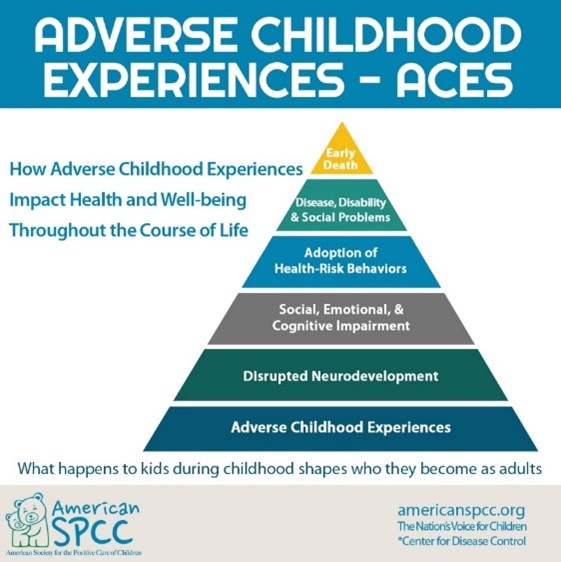When children experience traumatic events, such as being victims or witnesses to violence, exposed to drug addiction, or living in fear of abuse, they can suffer. Trauma over stresses the developing brain, which can impact emotional response and force children into constant “survival mode”. Decades of research have established the link between a child’s exposure to trauma, its effect on neurological and behavioral development and long-term consequences. Left unaddressed, childhood exposure to trauma can impact mental and physical well-being, healthy relationships, and academic achievement, which only fuels the cycle of violence, addiction, and poverty. It is estimated that approximately 60% of adults and 50% of children have been exposed to adverse childhood experiences.
There is something you can do to prevent the consequences of ACEs. All a child’s experiences, both positive and adverse, matter. Studies show that positive childhood experiences show a direct relationship with adult mental and relational health. In other words, for those who are exposed to ACEs, those with more positive childhood experiences showed better lifelong mental and relational health than those with fewer positive experiences. For example, individuals who reported 3-5 positive childhood experiences compared to those with 0-2 events, had a 50% lower risk of developing depression or poor mental health as an adult. These findings demonstrate that positive childhood experiences could buffer against the negative lifelong health effects caused by exposure to ACEs.
This is important to remember this during the pandemic and beyond. The prevention of adverse events, and the reinforcement of positive experiences will improve a child’s resiliency and long-term outcome. ( Bethell, C. et al, “Positive Childhood Experiences and Adult Mental and Relational Health in a Statewide Sample”, JAMA Pediatr. 2019:e193007.)

Other Resources
new Talking to Children about War | The National Child Traumatic Stress Network (nctsn.org)
New Article: How Adverse Childhood Experiences Affect Emotional Intelligence | Psychology Today
Trauma and Adverse Childhood Experiences (In American Sign Language)
TRM Academy – Trauma Informed Practice
Resources to Support Youth and Families During the Coronavirus COVID-19 Outbreak | Youth.gov
Ten Ways for Families to Promote Positive Childhood Experiences
Resilience and Child Traumatic Stress
The Traumatic Impact of COVID on Children and Families
After A Crisis: How Young Children Heal
What We Can Do About Toxic Stress
7 Protective Factors That Promote Children’s Resilience
